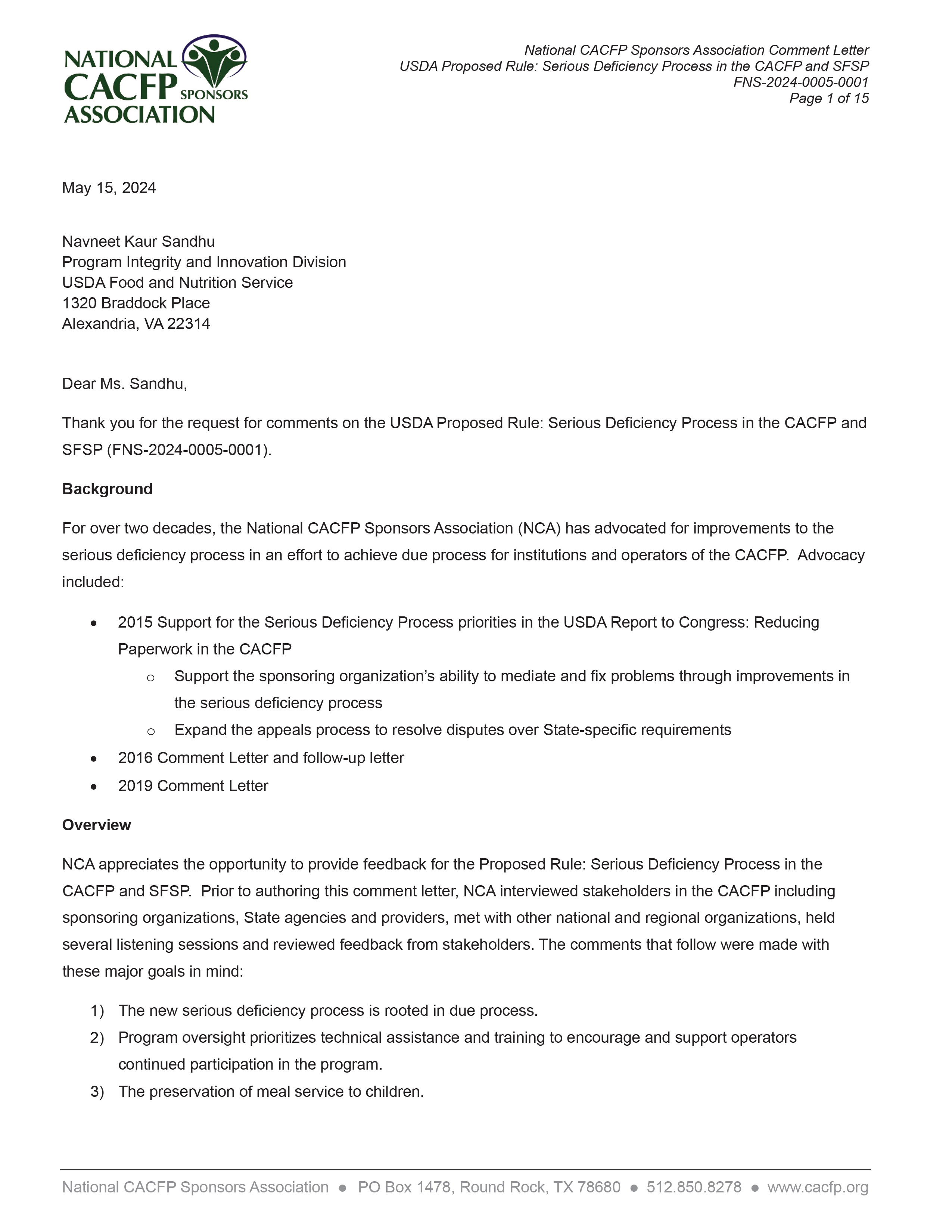NCA Response – Proposed Rule for the Serious Deficiency Process
May 17, 2024

In February 2023, USDA released the proposed rule Serious Deficiency Process in the Child and Adult Care Food Program and Summer Food Service Program. The proposed changes include extending the process to sponsored unaffiliated centers in the CACFP and the Summer Food Service Program.
After meeting with NCA members and extensive research, NCA provided our response to USDA stating which proposed changes NCA supports and does not support along with potential impacts.
NCA also created model comments to be used and personalized by our members, resulting in over 150 comments to the proposed rule comment portal within the first week of model comment release.
Executive Summary NCA’s Response to the Proposed Rule
For over two decades, the National CACFP Sponsors Association (NCA) has advocated for improvements to the
serious deficiency process in an effort to achieve due process for institutions and operators of the CACFP. Advocacy
included:
- 2015 Support for the Serious Deficiency Process priorities in the USDA Report to Congress: Reducing
Paperwork in the CACFP- Support the sponsoring organization’s ability to mediate and fix problems through improvements in
the serious deficiency process - Expand the appeals process to resolve disputes over State-specific requirements
- Support the sponsoring organization’s ability to mediate and fix problems through improvements in
- 2016 Comment Letter and follow-up letter
- 2019 Comment Letter
NCA appreciates the opportunity to provide feedback for the Proposed Rule: Serious Deficiency Process in the CACFP and SFSP. Prior to authoring this comment letter, NCA interviewed stakeholders in the CACFP including sponsoring organizations, State agencies and providers, met with other national and regional organizations, held several listening sessions and reviewed feedback from stakeholders. The comments that follow were made with these major goals in mind:
- The new serious deficiency process is rooted in due process.
- Program oversight prioritizes technical assistance and training to encourage and support operators
continued participation in the program. - The preservation of meal service to children.
USDA Food and Nutrition Service’s (FNS) stated purpose of the serious deficiency process:
“The serious deficiency process provides a systematic way for State agencies and sponsoring organizations to correct serious management problems, and when that effort fails, protect child nutrition program integrity through due process.”
While NCA agrees that the serious deficiency process can be a tool used by State agencies and sponsoring organizations to address program compliance and integrity, NCA strongly believes the serious deficiency process:
- should be used for truly serious and/or systemic management problems.
- should be applied fairly and consistently across all States.
- should NOT be used for findings resulting from inadvertent human error or unintentional administrative error, even if repeated.
- should be focused on serious mismanagement, abuse, and fraud by institutions and facilities participating in the program.
- should be limited to federal regulations only and not state-specific requirements.
Feedback obtained through NCA member surveys and interviews indicates that it takes, on average, one year to really learn the CACFP. Several studies indicate the paperwork requirements alone are a barrier to CACFP participation and have increased significantly since 2010 according to stakeholders.
NCA urges FNS to continue to place an emphasis on technical assistance and training. Feedback from stakeholders mentioned the CACFP “can feel punitive” and that the current serious deficiency process specifically was lacking due process. Therefore, NCA recommends FNS provide guidance to encourage State agencies and sponsoring organizations to use continuous technical assistance to resolve findings, even if repeated. Given the complexity of the CACFP, State agencies and sponsoring organization can expect to provide ongoing technical assistance and training to support learning the CACFP and to work to address barriers, such as cultural and language differences to ensure institutions and operators gain full understanding of the requirement of the program.
